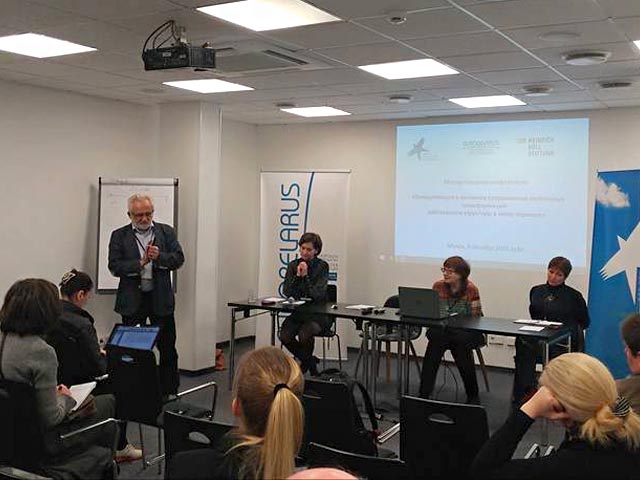The Belarusan National Platform of the EaP CSF issued a statement in connection with the wave of searches in the editorial offices of the Belarusan media and the detention of journalists.
Belarusization under global attacks

Belarusan intellectuals presented their views on “Belarusization in the context of current global transformations: effective structures in the era of changes”  .
.
International conference with such title was held in Minsk by the Center for European Transformation, International Consortium “EuroBelarus” and the Heinrich Böll Foundation on December 9.
EuroBelarus Information Service presents a brief overview of the talks, which were given.
Uladzimir Matskevich, philosopher and methodologist said that “It seemed to me, in Belarus we can work with cultural policy, implement reforms as Belarus is homogeneous enough to make actions on a national scale possible.”
However, after it became clear that “most of initiatives were unsuccessful, I realized that it is very difficult to do something in Belarus precisely because of the homogeneity.”
“There are people in our society who are responsible locally. But who will take responsibility for everything?" questions Uladzimir Matskevich.
According to the expert, now it is possible to single out several phenomena, which he called “worlds”, in the structure of the Belarusan society:
“First World” comprises the producers and supporters of innovations and those who use these innovations themselves. “Third World" includes people who completely reject the innovation. And the “Second World” is those who would like to have innovations, eager to implement them, understand innovations somehow, but they do not have the opportunity to use them.
The “second world” would like to be relevant to the global world, but they do not possess the means, skills and abilities, “they are able to want and get the benefits of the modern world only here in Belarus.” “Therefore, it is the “second world” people who are interested in politics and in Belarus as such,” continued Uladzimir Matskevich.
Today the development of Belarus is only possible through an actual dialogue. To do this, we must accept ourselves as a part of this or that “World”, concluded the philosopher.
Tatsiana Vadalazhskaya, methodologist and sociologist, notes that the issue national university establishment is becoming acute again.
“I believe, a National University today should function as a corporation, which must formulate its own agenda,” shared the expert.
Andrei Yahorau, methodologist and a political scientist, director of the Center for European Transformation, underlines that the “crisis” of national states “was there almost from the very beginning of globalization in the late 1980s — early 1990s”:
Firstly, the power, which was previously concentrated in a national state, now goes to the global level, and we can see no subjects able to take it under control there.
Secondly, the territory of a sovereign state is expropriated in favor of local communities.
Thirdly, the very carrier of the national sovereignty, i.e. the nation or people begin to disintegrate. All roads are open for a global sitizen and then everything is determined by their personal abilities and their own choices.
Moreover, national unity is collapsing under the influence of the leveling of cultural identities as well. The cultural, national, religious, regional, professional minorities become equal to nations and call for some sort of autonomy and sovereignty.
Some states try to open up to the new global trends, others vice versa.
According to Andrei Yahorau, the European Union has been — and might still be — a successful attempt at accepting and predicting global trends.
The video conference (in Russian and Belarusan):
Others
-
Statement of the Belarusan EaP CSF National Platform on solidarity with the civil society of Armenia
The Belarusan National Platform of the Eastern Partnership Civil Society Forum issued a statement on solidarity with the civil society of Armenia.
-
Statement of the BNP in connection with the criminal prosecution of the leaders of the Belarusan independent trade unions
The Belarusan National Platform of the Eastern Partnership Civil Society Forum issued a statement in connection with the criminal prosecution of the leaders of the Belarusan independent trade unions.
-
Final event of project CHOICE — Paving the way to European Year of Cultural Heritage 2018
The final event of the two-year EU funded project CHOICE — Cultural Heritage: Opportunity for Improving Civic Engagement was held on June 6, 2017 at the Committee of the Regions, in Brussels.
-
Heritage is a verb. The results of the CHOICE project were summarized in Minsk (Photos and video)
Does Belarus need a “Public Ministry of Culture” and “Ašmiany Charter” to deal with the historical and cultural sites?








Comments
From farewell to a new Eastern policy and towards a new development
Poland and Germany were both initiators and drivers of a New Eastern policy linked to the Eastern neighborhood and Russia/Soviet Union.